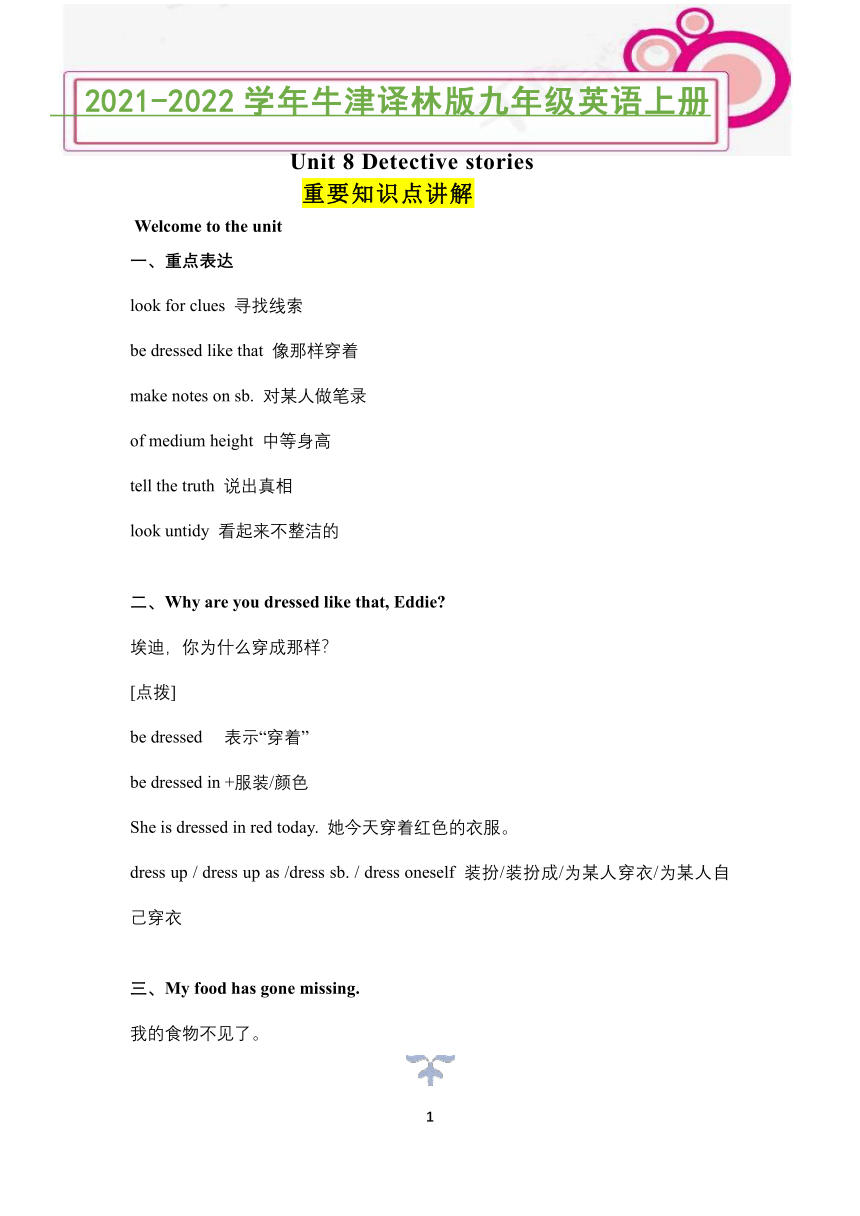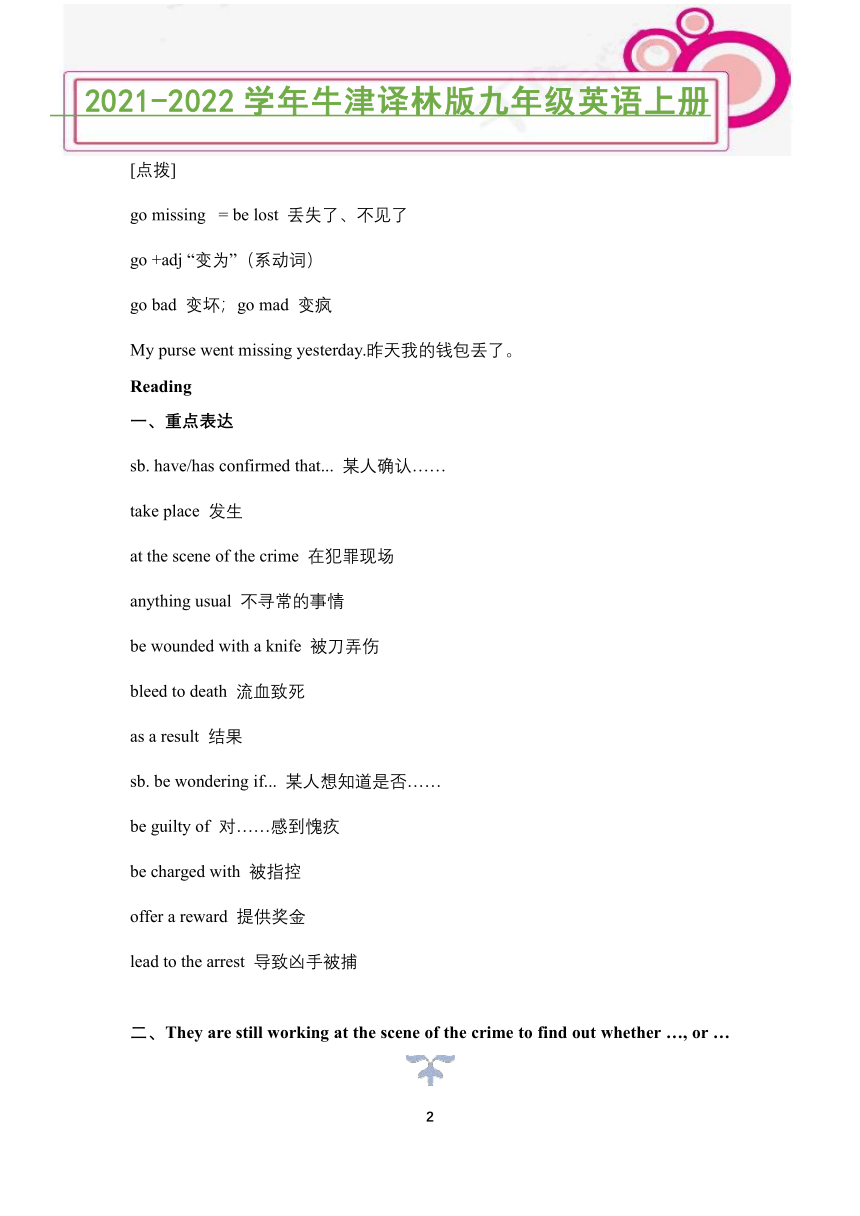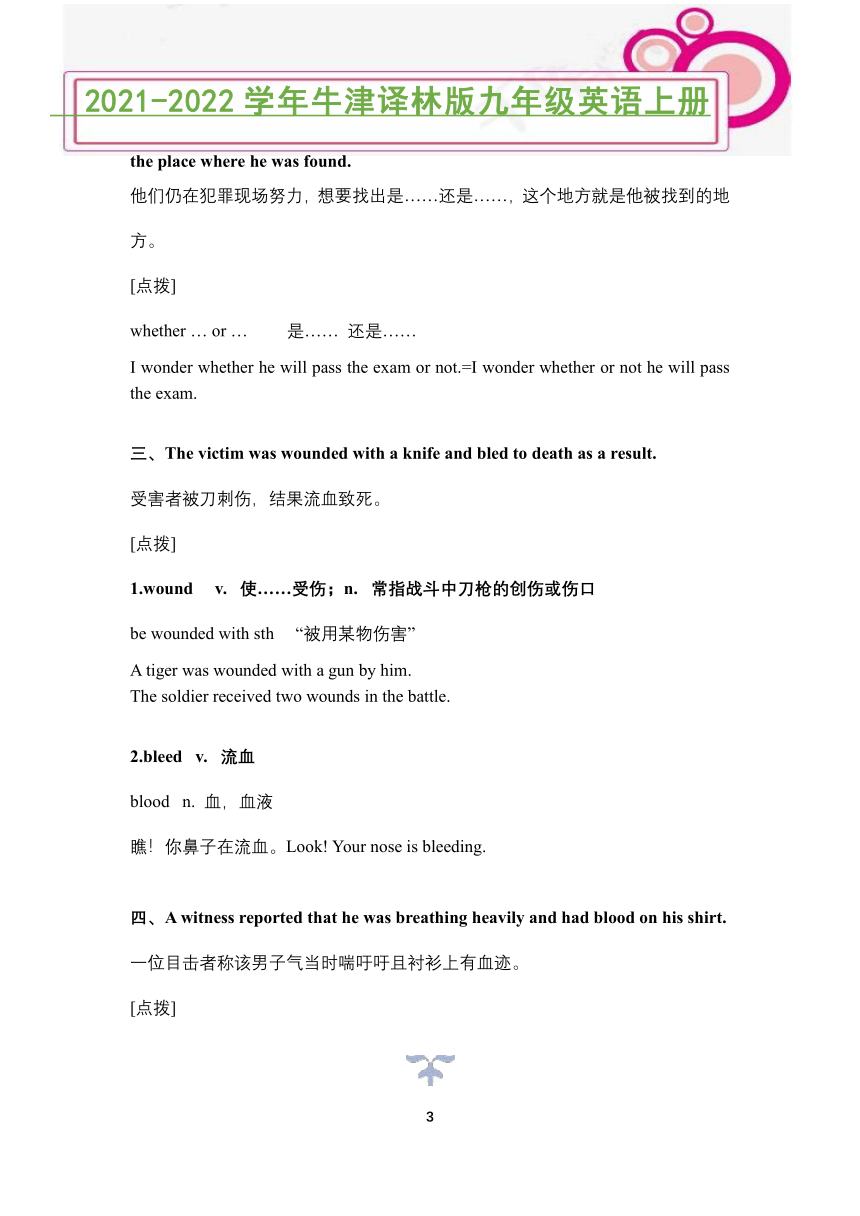牛津译林版九年级英语上册Unit 8 Detective stories重要知识点讲解
文档属性
| 名称 | 牛津译林版九年级英语上册Unit 8 Detective stories重要知识点讲解 |  | |
| 格式 | doc | ||
| 文件大小 | 111.5KB | ||
| 资源类型 | 教案 | ||
| 版本资源 | 牛津译林版 | ||
| 科目 | 英语 | ||
| 更新时间 | 2021-07-28 17:10:12 | ||
图片预览



文档简介
Unit 8 Detective stories
重要知识点讲解
?Welcome to the unit
一、重点表达
look for clues 寻找线索
be dressed like that 像那样穿着
make notes on sb. 对某人做笔录
of medium height 中等身高
tell the truth 说出真相
look untidy 看起来不整洁的
二、Why are you dressed like that, Eddie?
埃迪,你为什么穿成那样?
[点拨]
be dressed ? 表示“穿着”
be dressed in +服装/颜色
She is dressed in red today. 她今天穿着红色的衣服。
dress up / dress up as /dress sb. / dress oneself 装扮/装扮成/为某人穿衣/为某人自己穿衣
三、My food has gone missing.
我的食物不见了。
[点拨]
go missing ?= be lost 丢失了、不见了
go +adj “变为”(系动词)
go bad 变坏;go mad 变疯
My purse went missing yesterday.昨天我的钱包丢了。
Reading
一、重点表达
sb. have/has confirmed that... 某人确认……
take place 发生
at the scene of the crime 在犯罪现场
anything usual 不寻常的事情
be wounded with a knife 被刀弄伤
bleed to death 流血致死
as a result 结果
sb. be wondering if... 某人想知道是否……
be guilty of 对……感到愧疚
be charged with 被指控
offer a reward 提供奖金
lead to the arrest 导致凶手被捕
二、They are still working at the scene of the crime to find out whether …, or … the place where he was found.
他们仍在犯罪现场努力,想要找出是……还是……,这个地方就是他被找到的地方。
[点拨]
whether … or … ? ? ?是…… 还是……?
I wonder whether he will pass the exam or not.=I wonder whether or not he will pass the exam.
三、The victim was wounded with a knife and bled to death as a result.
受害者被刀刺伤,结果流血致死。
[点拨]
1.wound ? v. ?使……受伤;n. ?常指战斗中刀枪的创伤或伤口
be wounded with sth “被用某物伤害”
A tiger was wounded with a gun by him.
The soldier received two wounds in the battle.
2.bleed ?v. ?流血?
blood ?n. 血,血液
瞧!你鼻子在流血。Look! Your nose is bleeding.
四、A witness reported that he was breathing heavily and had blood on his shirt.
一位目击者称该男子气当时喘吁吁且衬衫上有血迹。
[点拨]
breathe ? v. ? 呼吸,喘气 ? (breathing)
breath ? ? n. ? 呼吸,一口气。
没有空气我们就不能呼吸。We can’t breathe without air.
Grammar
一、定语从句
1.定义:
修饰前面某一名词或代词的从句叫定语从句。
2.结构:
先行词 + 关系词 + 句子
3.关系代词:
that, which, who, whom, whose
如果先行词是表示物的名词或代词,关系代词应用that、which.?(作主语或宾语);
如果先行词是表示人的名词或代词,关系代词应用who, that ??(作主语或宾语) whom (作宾语)。
4.小结:
(1)that- 既可指人,也可指物,作主语,不能省略;作宾语,可以省略。
(2)which-指物,作主语,不能省略;作宾语,可以省略.
(3)who- 指人,作主语,不能省略;作宾语,可以省略,(常用whom)
注:当关系代词在定语从句中作主语时,定语从句的谓语动词形式由先行词定。
二、特殊情况
有时只能用 that , 不用 which, 常见的情况有六种:
1.当先行词是 all, any, few, little, none, anything, everything, nothing , everybody,nobody, everyone, no one 或被它们修饰时。
That’s all that I know.
Is there anything that I can do for you?
He answered few questions that the teacher asked.
2.当先行词被形容词最高级或序数词修饰时
That is the most interesting book that I have ever read.
The first thing that I should do is to review my lessons.
3.当先行词有the very, the only, the same等修饰时。
That’s the only thing that I can do now.
These are the very words that he used.
4.当主句以 who 或 which开头时,定语从句的关系词用 that, 而不用 which 或 who.
Who is the girl that spoke to you just now?
Which is the pen that you lost ?
5.先行词同时包括人或物时,关系词用that.
The man and his dog that I always meet are standing by the gate.
Integrated skills
一、重点表达
a man of great wealth 十分富有的一个人
no criminal record ?无犯罪记录
lock the door 锁门
had better do sth 最好做……
carry sth. with sb. 某人带……
二、I think we need to guard against any possible danger around us.
我认为我们应该保护自己不被身边的危险所伤害。
[点拨]
guard vt. 可指“保护”“守卫”以防外敌侵入,也可指“看守”“控制”以防内部人外逃。引申可指“防范”“严守机密”“警惕”“预防”等。
He keeps a dog to guard the house.
guard against (doing) sth 防范,提防(某事)
Task
一、重点表达
plan to do 打算做……
police station 警察局
gold necklace 金项链
be charged with 被指控为
valuable jewellery 价值连城的珠宝
1
重要知识点讲解
?Welcome to the unit
一、重点表达
look for clues 寻找线索
be dressed like that 像那样穿着
make notes on sb. 对某人做笔录
of medium height 中等身高
tell the truth 说出真相
look untidy 看起来不整洁的
二、Why are you dressed like that, Eddie?
埃迪,你为什么穿成那样?
[点拨]
be dressed ? 表示“穿着”
be dressed in +服装/颜色
She is dressed in red today. 她今天穿着红色的衣服。
dress up / dress up as /dress sb. / dress oneself 装扮/装扮成/为某人穿衣/为某人自己穿衣
三、My food has gone missing.
我的食物不见了。
[点拨]
go missing ?= be lost 丢失了、不见了
go +adj “变为”(系动词)
go bad 变坏;go mad 变疯
My purse went missing yesterday.昨天我的钱包丢了。
Reading
一、重点表达
sb. have/has confirmed that... 某人确认……
take place 发生
at the scene of the crime 在犯罪现场
anything usual 不寻常的事情
be wounded with a knife 被刀弄伤
bleed to death 流血致死
as a result 结果
sb. be wondering if... 某人想知道是否……
be guilty of 对……感到愧疚
be charged with 被指控
offer a reward 提供奖金
lead to the arrest 导致凶手被捕
二、They are still working at the scene of the crime to find out whether …, or … the place where he was found.
他们仍在犯罪现场努力,想要找出是……还是……,这个地方就是他被找到的地方。
[点拨]
whether … or … ? ? ?是…… 还是……?
I wonder whether he will pass the exam or not.=I wonder whether or not he will pass the exam.
三、The victim was wounded with a knife and bled to death as a result.
受害者被刀刺伤,结果流血致死。
[点拨]
1.wound ? v. ?使……受伤;n. ?常指战斗中刀枪的创伤或伤口
be wounded with sth “被用某物伤害”
A tiger was wounded with a gun by him.
The soldier received two wounds in the battle.
2.bleed ?v. ?流血?
blood ?n. 血,血液
瞧!你鼻子在流血。Look! Your nose is bleeding.
四、A witness reported that he was breathing heavily and had blood on his shirt.
一位目击者称该男子气当时喘吁吁且衬衫上有血迹。
[点拨]
breathe ? v. ? 呼吸,喘气 ? (breathing)
breath ? ? n. ? 呼吸,一口气。
没有空气我们就不能呼吸。We can’t breathe without air.
Grammar
一、定语从句
1.定义:
修饰前面某一名词或代词的从句叫定语从句。
2.结构:
先行词 + 关系词 + 句子
3.关系代词:
that, which, who, whom, whose
如果先行词是表示物的名词或代词,关系代词应用that、which.?(作主语或宾语);
如果先行词是表示人的名词或代词,关系代词应用who, that ??(作主语或宾语) whom (作宾语)。
4.小结:
(1)that- 既可指人,也可指物,作主语,不能省略;作宾语,可以省略。
(2)which-指物,作主语,不能省略;作宾语,可以省略.
(3)who- 指人,作主语,不能省略;作宾语,可以省略,(常用whom)
注:当关系代词在定语从句中作主语时,定语从句的谓语动词形式由先行词定。
二、特殊情况
有时只能用 that , 不用 which, 常见的情况有六种:
1.当先行词是 all, any, few, little, none, anything, everything, nothing , everybody,nobody, everyone, no one 或被它们修饰时。
That’s all that I know.
Is there anything that I can do for you?
He answered few questions that the teacher asked.
2.当先行词被形容词最高级或序数词修饰时
That is the most interesting book that I have ever read.
The first thing that I should do is to review my lessons.
3.当先行词有the very, the only, the same等修饰时。
That’s the only thing that I can do now.
These are the very words that he used.
4.当主句以 who 或 which开头时,定语从句的关系词用 that, 而不用 which 或 who.
Who is the girl that spoke to you just now?
Which is the pen that you lost ?
5.先行词同时包括人或物时,关系词用that.
The man and his dog that I always meet are standing by the gate.
Integrated skills
一、重点表达
a man of great wealth 十分富有的一个人
no criminal record ?无犯罪记录
lock the door 锁门
had better do sth 最好做……
carry sth. with sb. 某人带……
二、I think we need to guard against any possible danger around us.
我认为我们应该保护自己不被身边的危险所伤害。
[点拨]
guard vt. 可指“保护”“守卫”以防外敌侵入,也可指“看守”“控制”以防内部人外逃。引申可指“防范”“严守机密”“警惕”“预防”等。
He keeps a dog to guard the house.
guard against (doing) sth 防范,提防(某事)
Task
一、重点表达
plan to do 打算做……
police station 警察局
gold necklace 金项链
be charged with 被指控为
valuable jewellery 价值连城的珠宝
1
